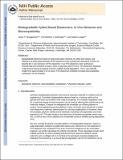Biodegradable xylitol-based elastomers: In vivo behavior and biocompatibility
Author(s)
Bruggeman, Joost P.; Bettinger, Christopher J.; Langer, Robert
DownloadAccepted version (3.676Mb)
Terms of use
Metadata
Show full item recordAbstract
Biodegradable elastomers based on polycondensation reactions of xylitol with sebacic acid, referred to as poly(xylitol sebacate) (PXS) elastomers have recently been developed. We describe the in vivo behavior of PXS elastomers. Four PXS elastomers were synthesized, characterized, and compared with poly(L-lactic-co-glycolic acid) (PLGA). PXS elastomers displayed a high level of structural integrity and form stability during degradation. The in vivo half-life ranged from approximately 3 to 52 weeks. PXS elastomers exhibited increased biocompatibility compared with PLGA implants. Keywords: biomaterial; elastomer; biocompatibility; degradation; poly(xylitol sebacate; xylitol
Date issued
2010-08Department
Massachusetts Institute of Technology. Department of Chemical Engineering; Charles Stark Draper LaboratoryJournal
Journal of Biomedical Materials Research
Publisher
Wiley-Blackwell
Citation
Bruggeman, Joost P., Bettingera, Christopher J. and Langera, Robert. "Biodegradable xylitol-based elastomers: In vivo behavior and biocompatibility." Journal of Biomedical Materials Research 95A, 1 (October 2010): 92-104 © 2010 Wiley Periodicals.
Version: Author's final manuscript
ISSN
1549-3296